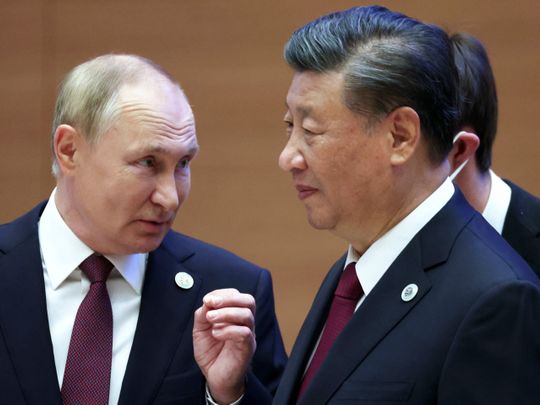
KYIV, Ukraine: Pressure on Russian President Vladimir Putin mounted both on the battlefield and in the halls of global power as Ukrainian troops waging a counteroffensive pushed Saturday to advance farther into the country’s partly recaptured northeast.
At a high-level summit in Uzbekistan, Putin vowed to press his attack on Ukraine despite recent military setbacks but also had to address concerns over the drawn-out conflict voiced by India and China.
“I know that today’s era is not of war,’’ Indian Prime Minister Narendra Modi told the Russian leader in televised comments as the two met Friday in Uzbekistan. At the same summit a day earlier, Putin acknowledged China’s unspecified “questions and concerns’’ about the war in Ukraine while also thanking Chinese President Xi Jinping for his government’s “balanced position’’ on the conflict.
The hurried retreat of his troops this month from parts of a northeast region they occupied early in the war, together with the rare public reservations expressed by key allies, underscored the challenges Putin faces on all fronts. Both China and India maintain strong ties with Russia and had sought to remain neutral on Ukraine.
Xi, in a statement released by his government, expressed support for Russia’s “core interests’’ but also interest in working together to “inject stability’’ into world affairs. Modi said he wanted to discuss “how we can move forward on the path of peace.’’
On the battlefield, Western defence officials and analysts on Saturday said Russian forces were apparently setting up a new defensive line in Ukraine’s northeast after Kyiv’s troops broke through the previous one and tried to press their advances further into the east.
The British Defence Ministry said in a daily intelligence briefing that the line likely is between the Oskil River and Svatove, some 150 km (90 miles) southeast of Kharkiv, Ukraine’s second-largest city.
The new line emerged after the Ukrainian counteroffensive punched a hole through the war’s previous front line, allowing Kyiv’s soldiers to recapture large swaths of land in the northeastern Kharkiv region that borders Russia.
Natural break
After the Russian troops retreated from the city of Izium, Ukrainian authorities discovered a mass grave site, one of the largest so far discovered. President Volodymyr Zelensky said Friday that more than 440 graves have been found at the site but that the number of victims is not yet known.
Ukrainian forces, in the meantime, continue to cross the key Oskil River in the Kharkiv region as they try to press on in a counteroffensive targeting Russian-occupied territory, according to the Washington-based Institute for the Study of War.
The Institute said in its Saturday report that satellite imagery it examined suggest that Ukrainian forces have crossed over to the east bank of the Oskil in Kupiansk, placing artillery there. The river, which flows south from Russia into Ukraine, had been a natural break in the newly emerged front lines since Ukraine launched its push about a week ago.
“Russian forces are likely too weak to prevent further Ukrainian advances along the entire Oskil River if Ukrainian forces choose to resume offensive operations,’’ the institute said.
Videos circulating online on Saturday indicated that Ukrainian forces are also continuing to take land in the country’s embattled east.
A Russian missile attack early Saturday started a fire in Kharkiv’s industrial area, said Oleh Syniehubov, the regional governor. Firefighters extinguished the blaze.
Explosions were also reported Saturday in the Russian-held parts of Zaporizhzhia. Russian-installed official Vladimir Rogov said on Telegram that at least five blasts were heard in the city of Melitopol, which was occupied early on in the war.












